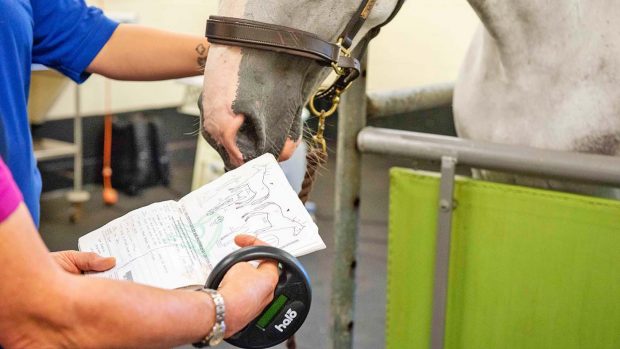New laws surrounding equine identification came into force in England today (1 October).
Defra’s new equine identification regulations legally require every horse, pony and donkey to be microchipped and possess a valid UK passport, with details stored in the Central Equine Database (CED).
All horses born after 30 June 2009 are already required to be microchipped. Owners of horses born before this date will have two years from today to get their equines microchipped.
Any changes in a horse’s ownership or status — for example, if they are put down, lost, stolen or signed out of the food chain — will need to be notified to the passport-issuing organisation. The organisation will then have 24 hours to update the CED.
The British Horse Council has welcomed the new regulations, hoping they will deter theft and fraudulent sales as well as being helpful in managing disease outbrakes, mapping the horse population and ensuring rapid communication with owners.
“Previous legislation has been half-baked but the new regulations are not only positive for horse owners, but are a significant boost for equine health and welfare,” said British Horse Council chairman Jeanette Allen.
“Having all up-to-date data recorded on the CED will help us better protect our equine population in the event of a disease outbreak, as well as providing essential tools to help owners find their horses in the event of theft or straying.
“It should also give owners confidence that horses which have previously been signed out of the human food chain never end up in the abattoir.
“However whilst this legislation has huge potential to benefit all of England’s horses, its success is critically dependent on horse owners along with law enforcers recognising that, without them playing their part, our horses will continue to face totally unnecessary risks.”
British Equine Veterinary Association chairman David Mountford added he hopes the regulations will ensure essential equine medicines remain available to vets.
“Certain veterinary medicines can only be administered to a horse if it can be identified, if treatment is recorded in the passport and/or if we can see that it is signed out of the human food chain,” said Mr Mountford.
“If the passport is not readily available at the point of care then the treatment options are limited, errors in medicines records are possible and the authorities will seek to restrict medicines availability.
“Under the new ID regulations vets will be able to positively identify the horse, check its status online and therefore use the most appropriate medicine with confidence. Vets want to do what is best for the horse and the new regulations will help ensure this is possible.”
World Horse Welfare chief executive Roly Owers added the ability to accurately link every horse to an owner is the “cornerstone of responsible ownership”.
“It increases traceability and ensures owners can be held accountable in the case of welfare problems or abandonment, rather than simply discarding their unwanted animals with no consequences,” he said.
Article continues below…
You might also be interested in:

How to feed your horse for less this winter
Find out how to make the most out of your horse’s feeding regime during the winter months

Owners urged to act now after ‘perfect storm’ increases atypical myopathy risk
The disease can occur up to four days after exposure and owners should contact their vet immediately if they spot

Subscribe to Horse & Hound magazine today – and enjoy unlimited website access all year round
“Welfare organisations and local authorities will now be more able to tackle the problem of unidentified horses and ponies, and local authorities should be better placed to enforce the legislation as they can now issue civil sanctions, such as fixed penalty notices, for non-compliance.
“It will also help ensure that any horses that have been illegally taken into another’s possession can be identified and returned to their rightful owner.
“For the first time, the CED will give a clear and accurate picture of England’s equine population which will help the industry to ensure equines are properly recognised and their welfare protected by Government through policy and legislation.”
Thoroughbred Breeders Association chief executive Claire Sheppard also welcomed the news.
“A robust system of identification for all the UK’s horses and ponies will underpin traceability, equine welfare and protection from disease,” she said.
“Whether this is for the largest thoroughbred stud or the owner of a single horse or pony, we will all benefit.”
For all the latest news analysis, competition reports, interviews, features and much more, don’t miss Horse & Hound magazine, on sale every Thursday




